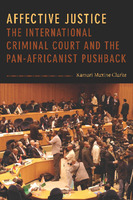Affective Justice
The International Criminal Court and the Pan-Africanist Pushback
Author(s)
Clarke, Kamari Maxine
Collection
Toward an Open Monograph Ecosystem (TOME)Language
EnglishAbstract
Since its inception in 2001, the International Criminal Court (ICC) has been met with resistance by various African states and their leaders, who see the court as a new iteration of colonial violence and control. In Affective Justice Kamari Maxine Clarke explores the African Union's pushback against the ICC in order to theorize affect's role in shaping forms of justice in the contemporary period. Drawing on fieldwork in The Hague, the African Union in Addis Ababa, sites of postelection violence in Kenya, and Boko Haram's circuits in Northern Nigeria, Clarke formulates the concept of affective justice—an emotional response to competing interpretations of justice—to trace how affect becomes manifest in judicial practices. By detailing the effects of the ICC’s all-African indictments, she outlines how affective responses to these call into question the "objectivity" of the ICC’s mission to protect those victimized by violence and prosecute perpetrators of those crimes. In analyzing the effects of such cases, Clarke provides a fuller theorization of how people articulate what justice is and the mechanisms through which they do so.
Keywords
affective justice; international rule of law assemblages; legal encapsulation; reattribution; victims; perpetrators; Freedom FighterDOI
10.1215/9781478090304ISBN
9781478007388; 9781478006701; 9781478005759Publisher
Duke University PressPublisher website
https://www.dukeupress.edu/Publication date and place
Durham, 2019Classification
Public international law: criminal law


 Download
Download Web Shop
Web Shop